In this guide, we'll walk you through the seamless process of bringing your existing data into Retable from various sources like CSV and XLSX files, Airtable, Google Sheets, or even direct URLs. Additionally, we'll explore how to kickstart your projects using Retable’s versatile templates. Let’s get started by understanding the importance of importing data efficiently and how it can transform your data management experience in Retable.
Table of contents
Importing data into Retable
Importing data is a fundamental feature that allows users to transition their existing databases or spreadsheets into Retable’s dynamic environment. This process not only saves time but also ensures that you can quickly leverage Retable’s powerful features without starting from scratch. Whether it’s from a CSV file, Airtable, or Google Sheets, importing is designed to be intuitive and user-friendly.
Importing a .csv or .xls(x) file
Retable allows you to create projects by easily importing your existing .xls and .csv files and start working immediately with your existing data. To do this, simply continue with the import option during the project creation phase. Here, you can follow the steps below to import existing .csv or .xls files into Retable;
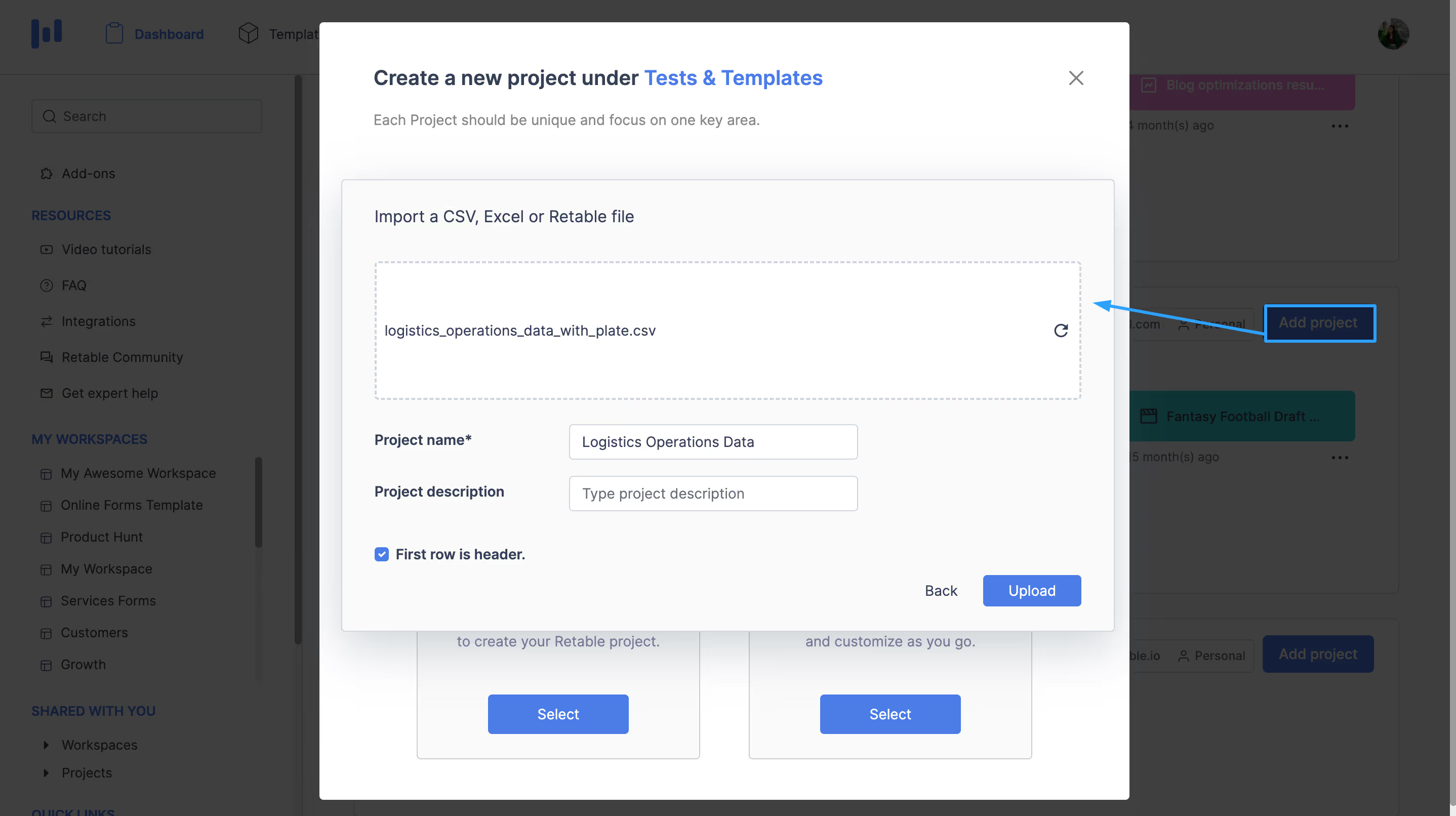
- Click the "+Add new project" icon on the top right side of your workspace.
- Select “Import a .csv or .xls(x)” and choose the file from your local desktop.
- If the first line is the header, select "First row is header."
- Click “Upload” to complete the import.
Importing from Airtable
Retable helps you easily migrate your data from Airtable to Retable without the need for any export operations. Thus, you can easily transfer your data from Airtable to Retable without any data loss and without being restricted by Airtable's export restrictions.
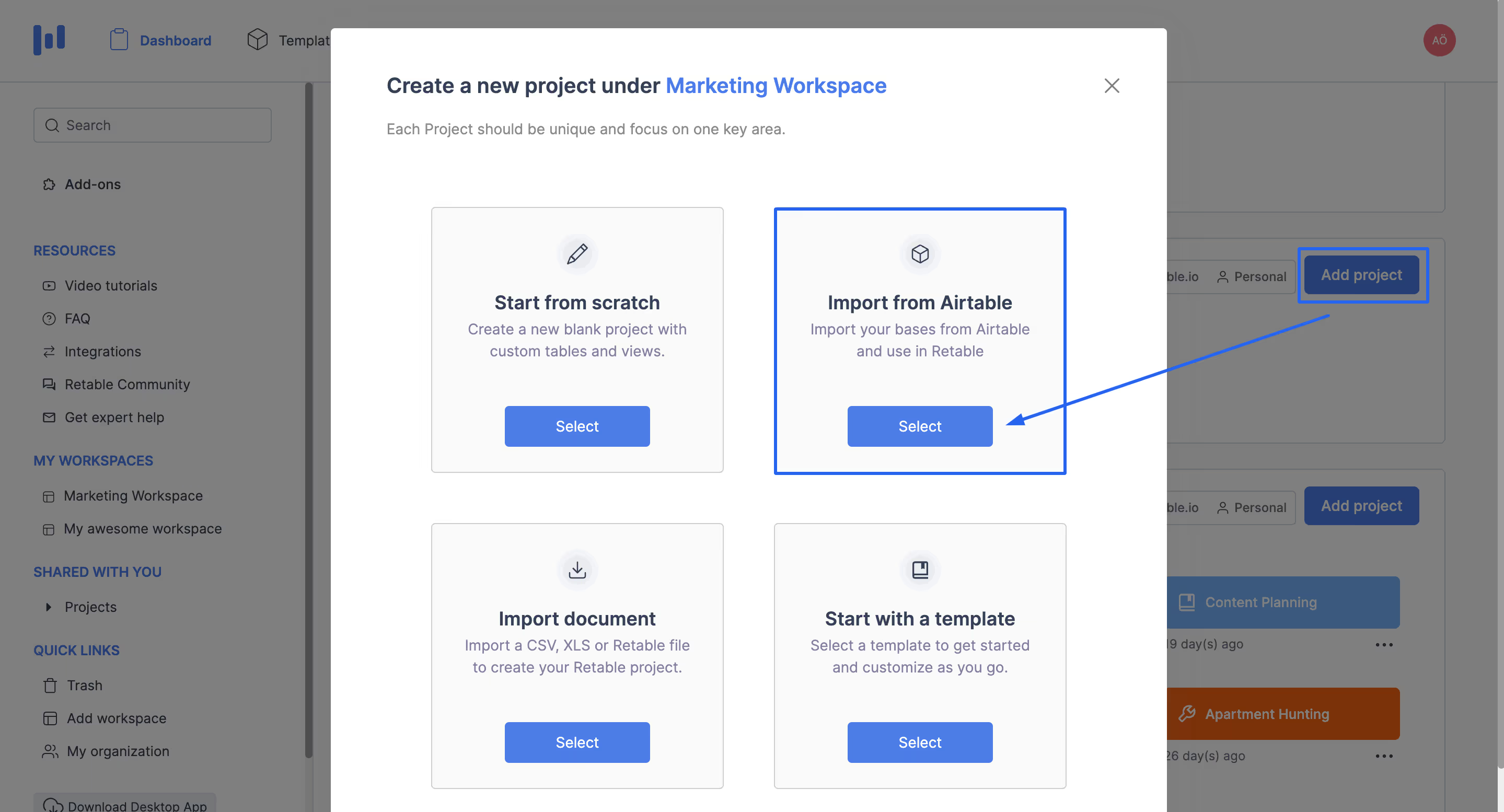
- Log in to your Airtable account and get your Airtable personal access token.
- Come back to your Retable dashboard.
- Click the "Add project" button on the top right of the workspace where you want to import your Airtable base.
- Select the "Import from Airtable" option from the pop-up window that opens.
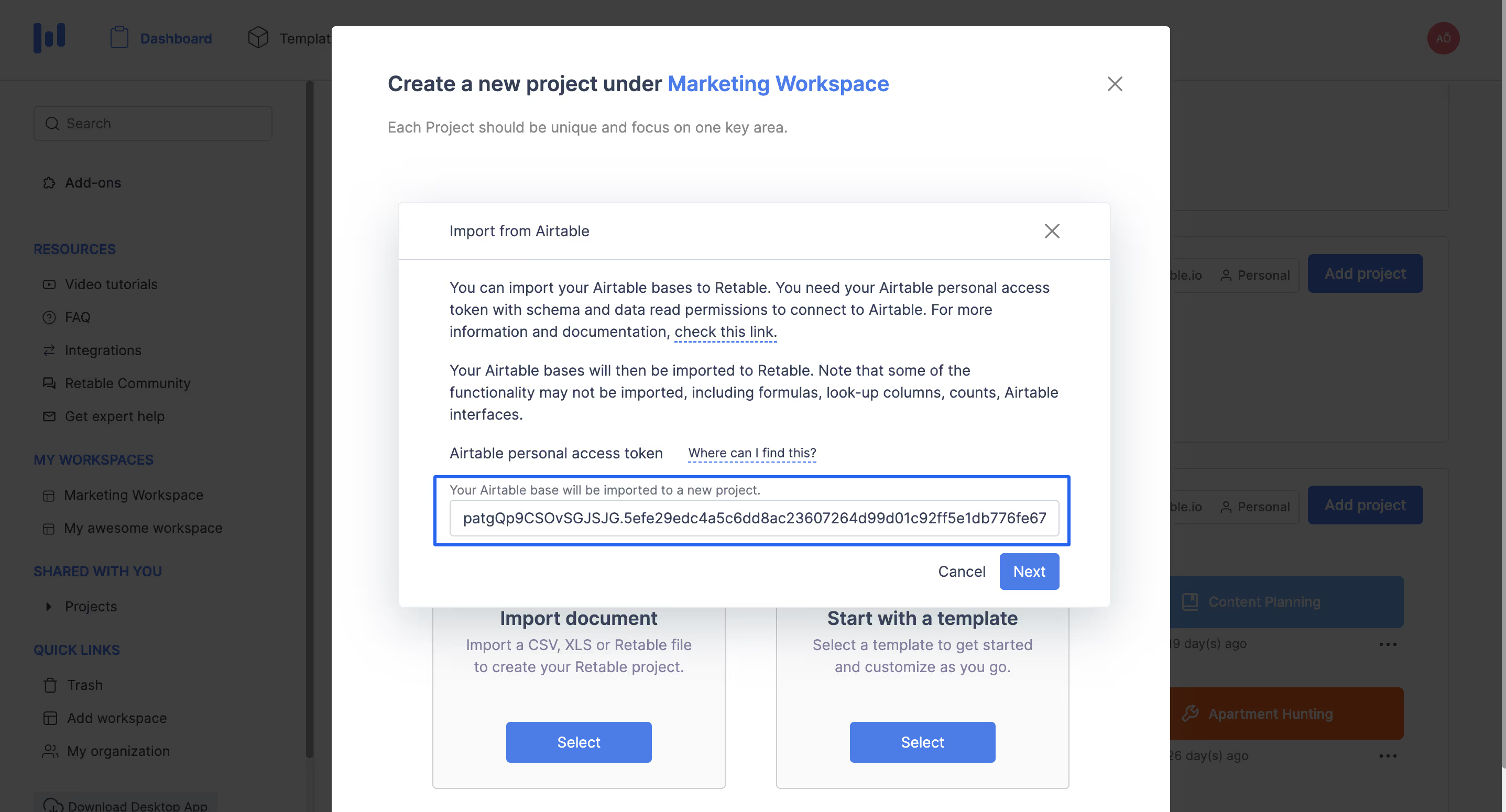
- Enter your Airtable personal access token into Retable's import screen.
- Click the "Next" button.

- Select the Airtable base you want to import into Retable.
- Click the "Import" button. Depending on your data size, it may take several minutes. You'll be notified via email when your import is completed. Refresh your dashboard after receiving your email notification.
Importing an existing .csv or .xls(x) file into an existing project
Retable allows you to import your existing .csv or .xls(x) files into your existing Retable projects. This is a super easy method, all you need to do is enter the project you want to import and select the existing file you want to import. Here, you can import your existing .csv or .xls(x) files into your Retable projects by following the steps below.
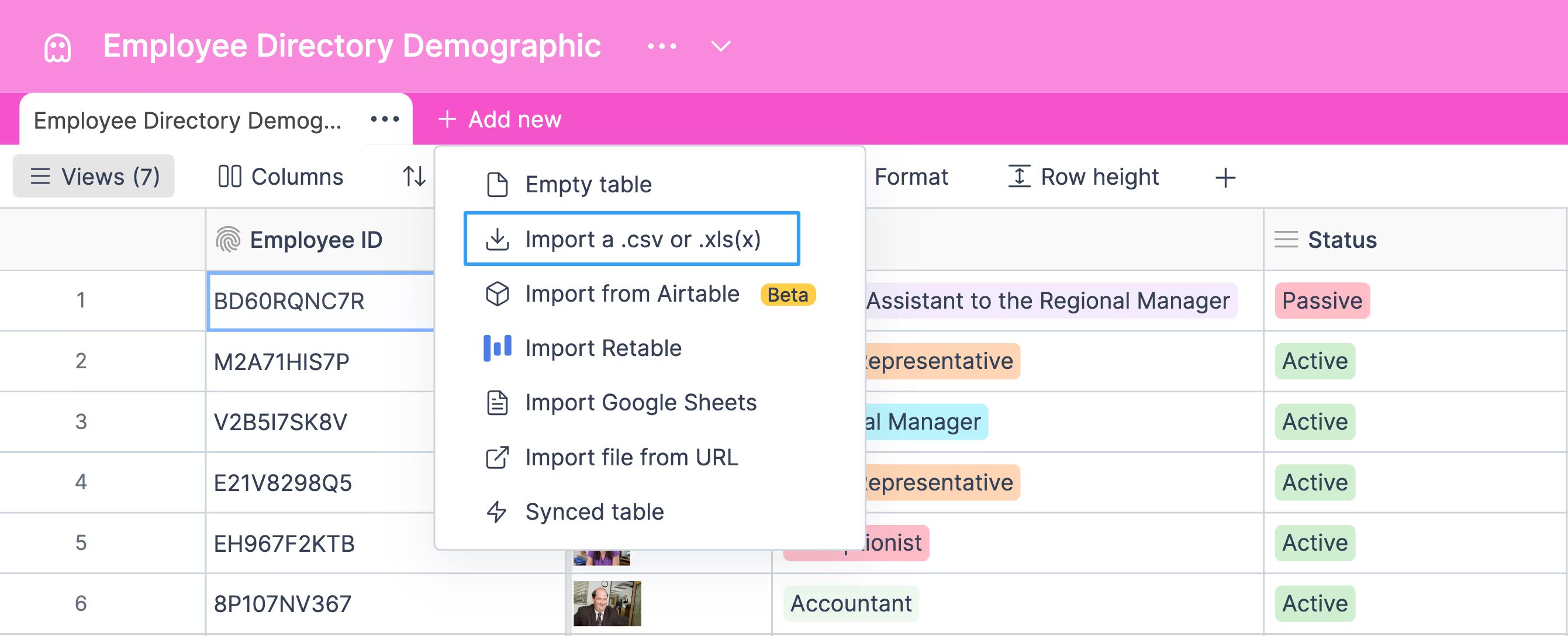
- Click on the three dots next to the table name and choose “Import a .csv or .xls(x).”
- Decide whether to Insert Data or Replace Data.
- Select the file from your desktop, match the columns if needed, and upload.
Importing a Retable file
Retable also allows you to re-import your existing Retable tables into any project you want after exporting them in .retable format or allows you to create a new project from scratch. This is best used in scenarios where you want to move a project to another workspace. After exporting your data in .retable format, if you import it into any other project or workspace, all customizations you have applied to your data will be preserved, including column types, formatting and views. Let's learn how to import your data in .retable format by following these steps together!
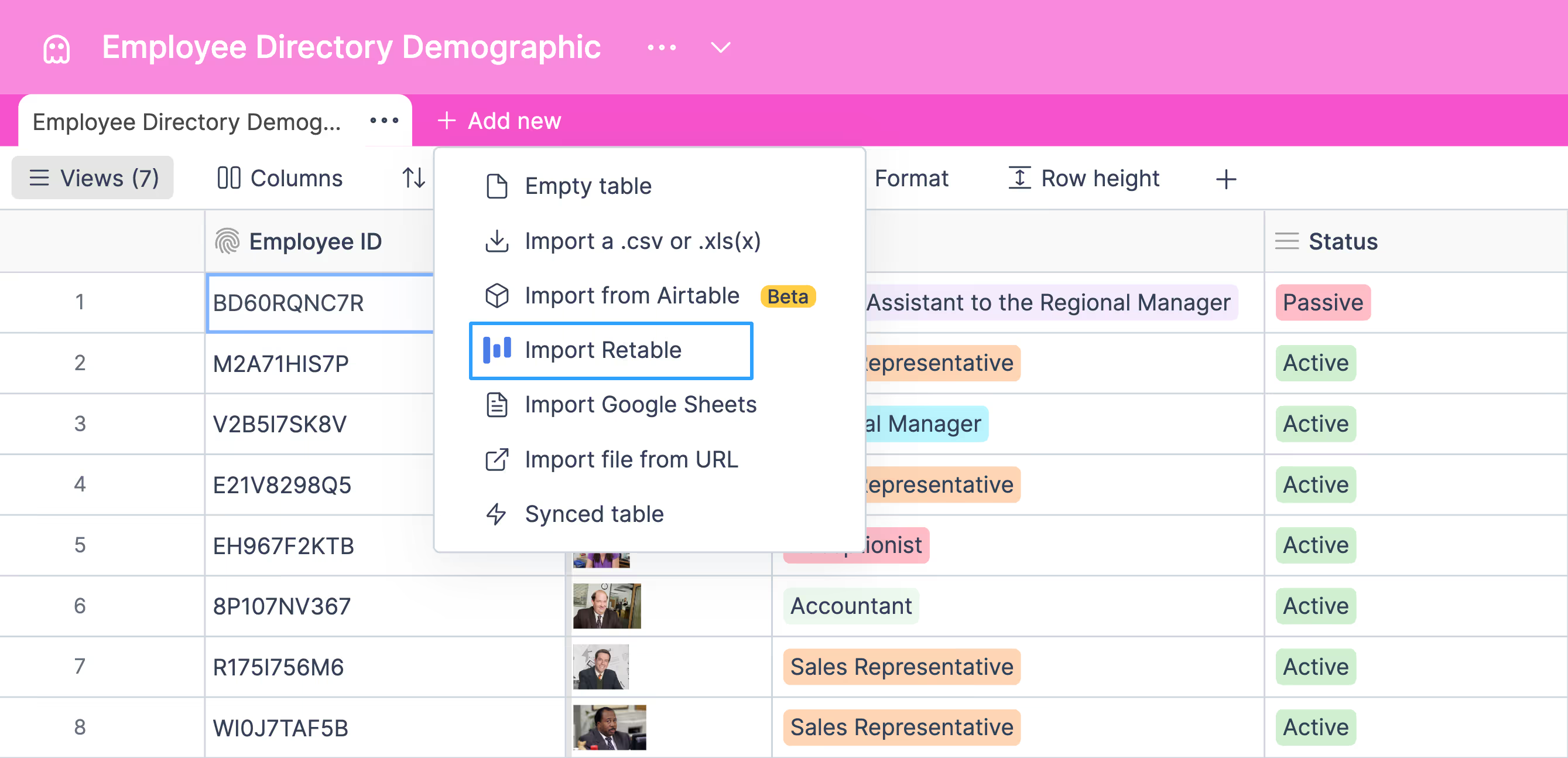
- Click the "+Add new" icon and select “Import Retable.”
- Choose the ".retable" file you've saved previously and click “Upload.”
Importing file from URL
Thanks to Retable's import file via URL feature, you can easily import any .csv file into your Retable projects by simply pasting the URL. Here, you can follow the steps below!
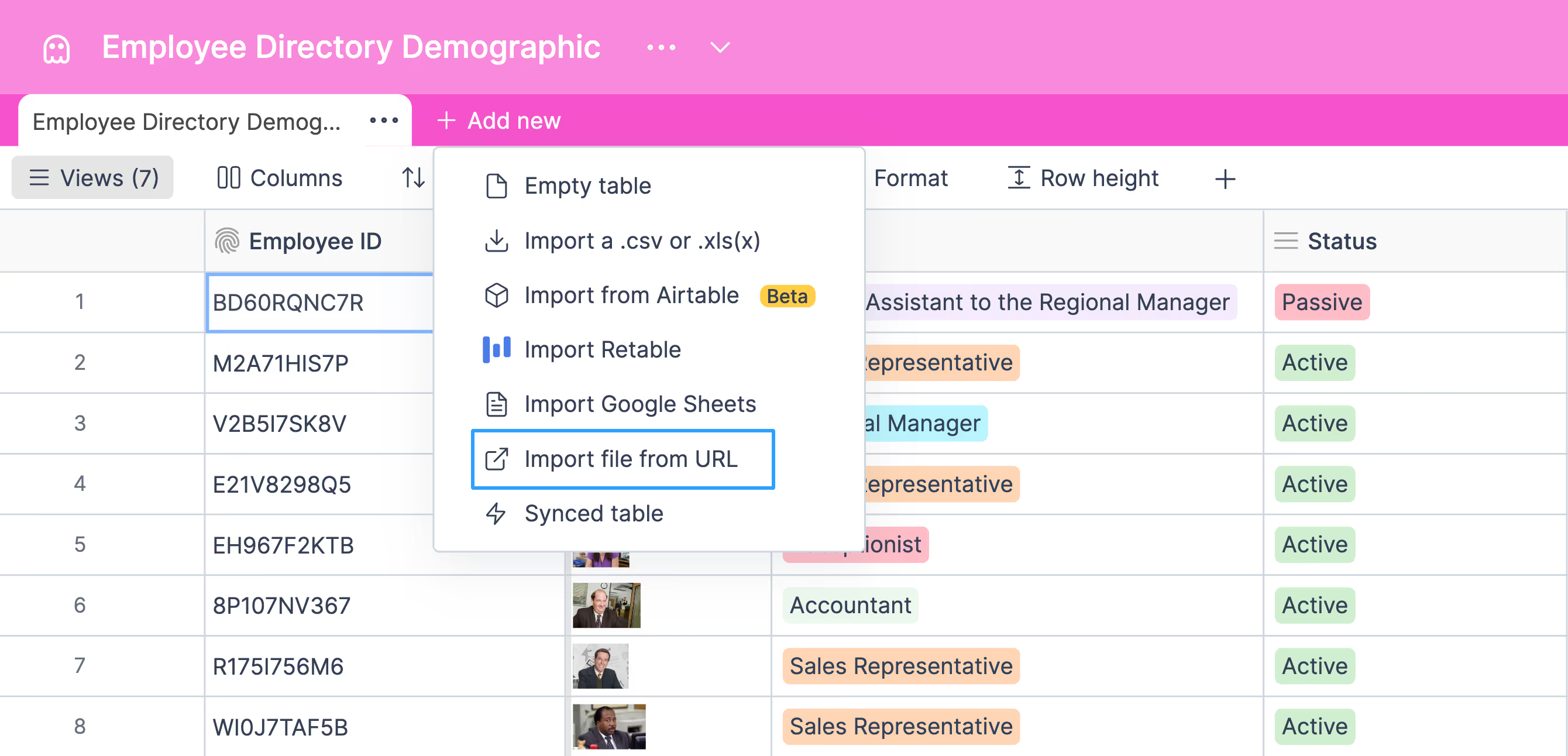
- Go to your project and add a new table.
- Select “Import file from URL.”
- Paste the URL of the .csv or .xlsx file you want to import and proceed.
Importing Google Sheets
You can easily integrate your Google Drive with Retable and quickly import the Google Sheets in your Google Drive into your Retable projects. Here, learn how to import your Google Sheets into Retable with just a few clicks!
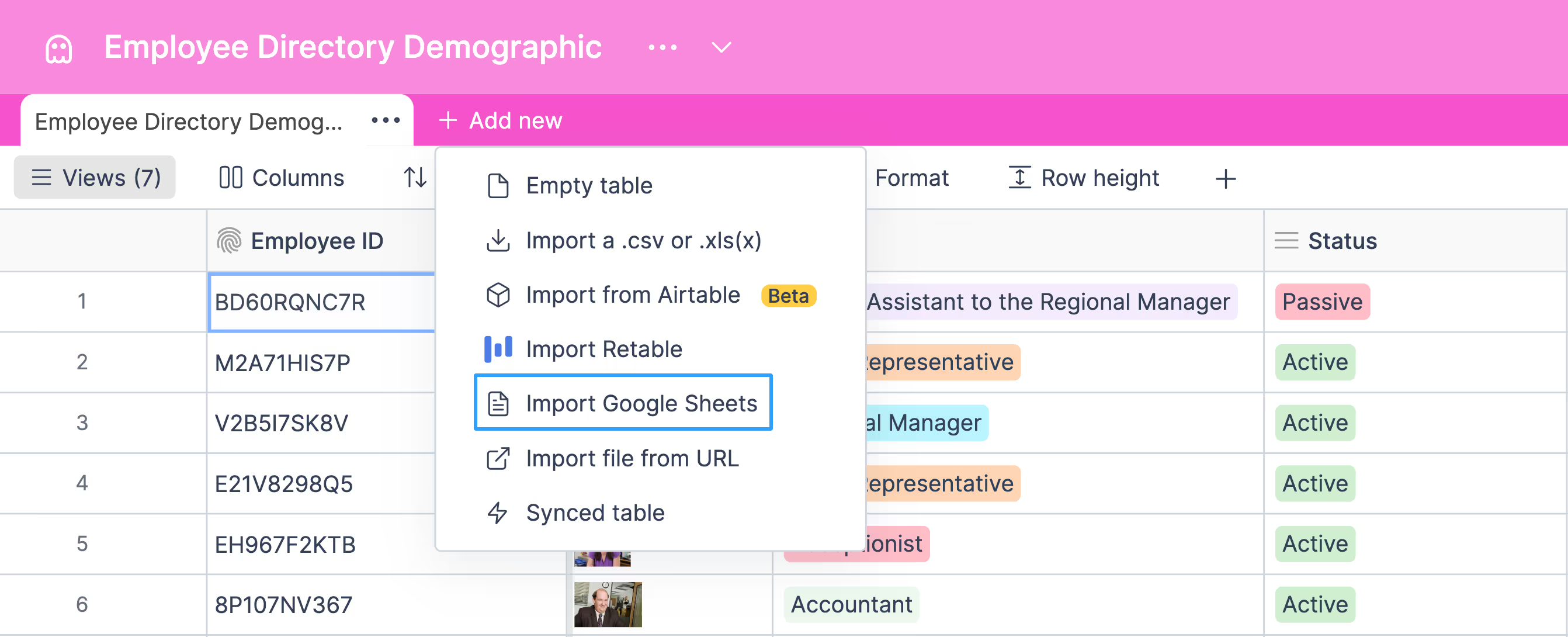
- Choose “Import Google Sheet” after clicking "+Add new."
- Connect to your Google account and select the file you wish to import.
Using Retable templates
Templates in Retable offer a quick start to your projects. They are pre-designed frameworks tailored for various use cases, allowing you to focus on the content rather than the setup. Using Retable's spreadsheet templates can dramatically speed up your workflow, providing you with structured formats and common functionalities, ready to be customized to your needs.
Accessing the template gallery
To reach the template gallery, you have three options:
- Click the "Templates" button located at the top of your dashboard.
- Choose "Start with a template" found under the "Add new project" menu.
- Visit the direct link: retable.io/templates.
Exploring templates
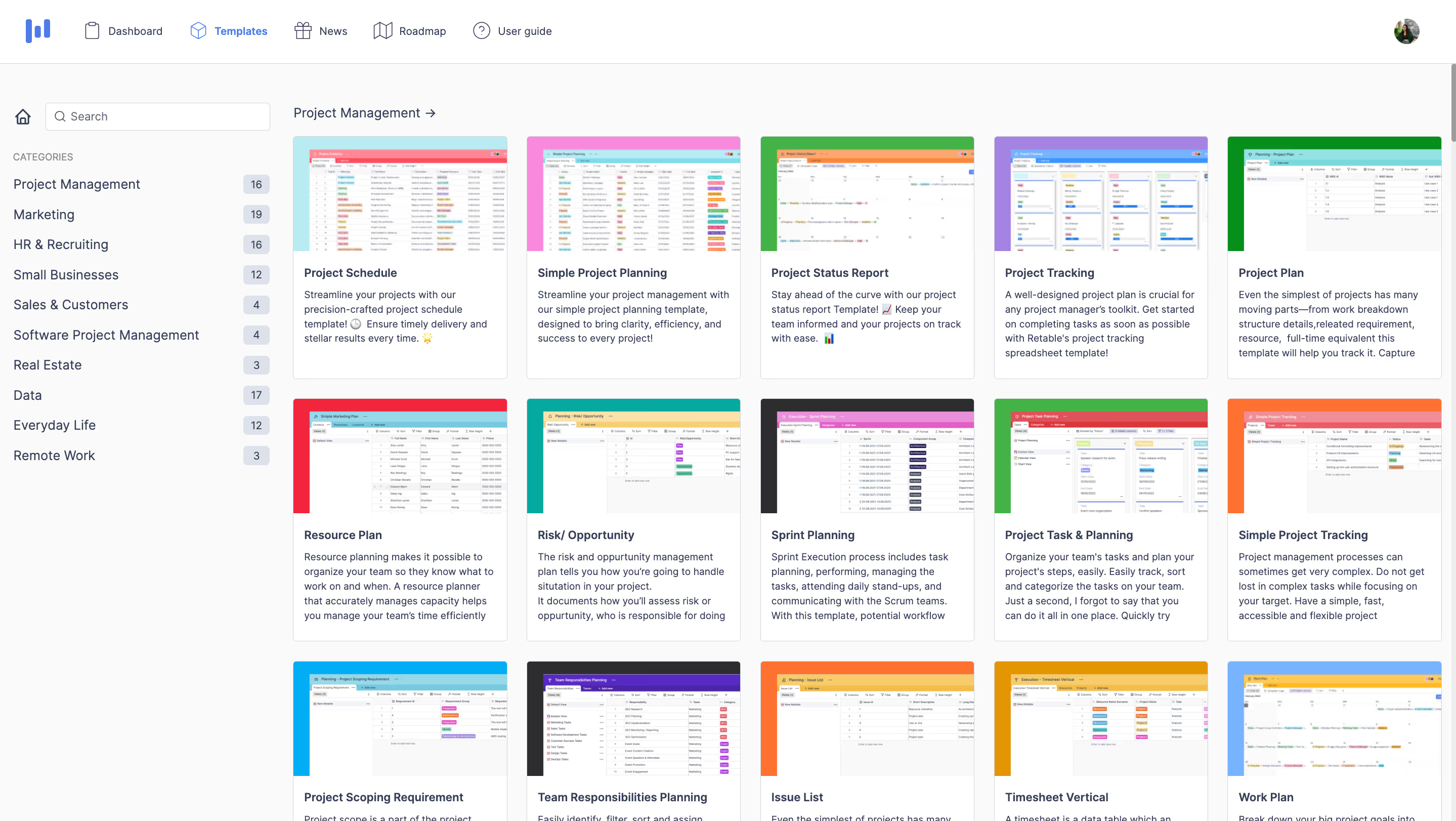
- Use the search bar at the top to quickly find templates that fit your project’s needs.
- If you are unsure what you are looking for, browse the template categories specific to your needs. Templates are categorized according to use cases.
- Each template card provides a brief overview of the template’s purpose and layout.
Previewing a template
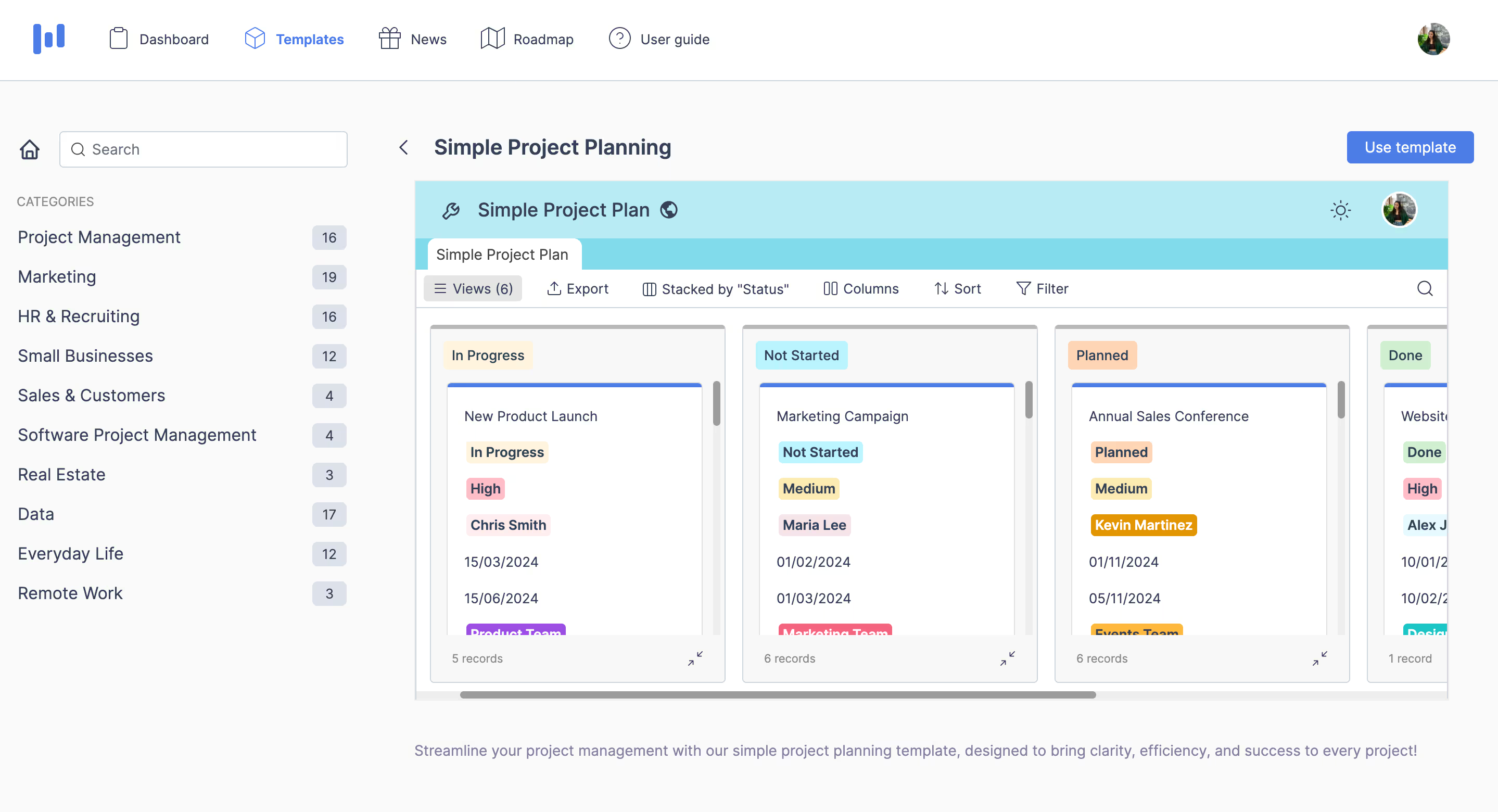
- Click on the template card that interests you. This will take you to a detailed page for that specific template.
- Preview the template to see its structure, fields, views, and any predefined content it may contain.
Using a Retable template
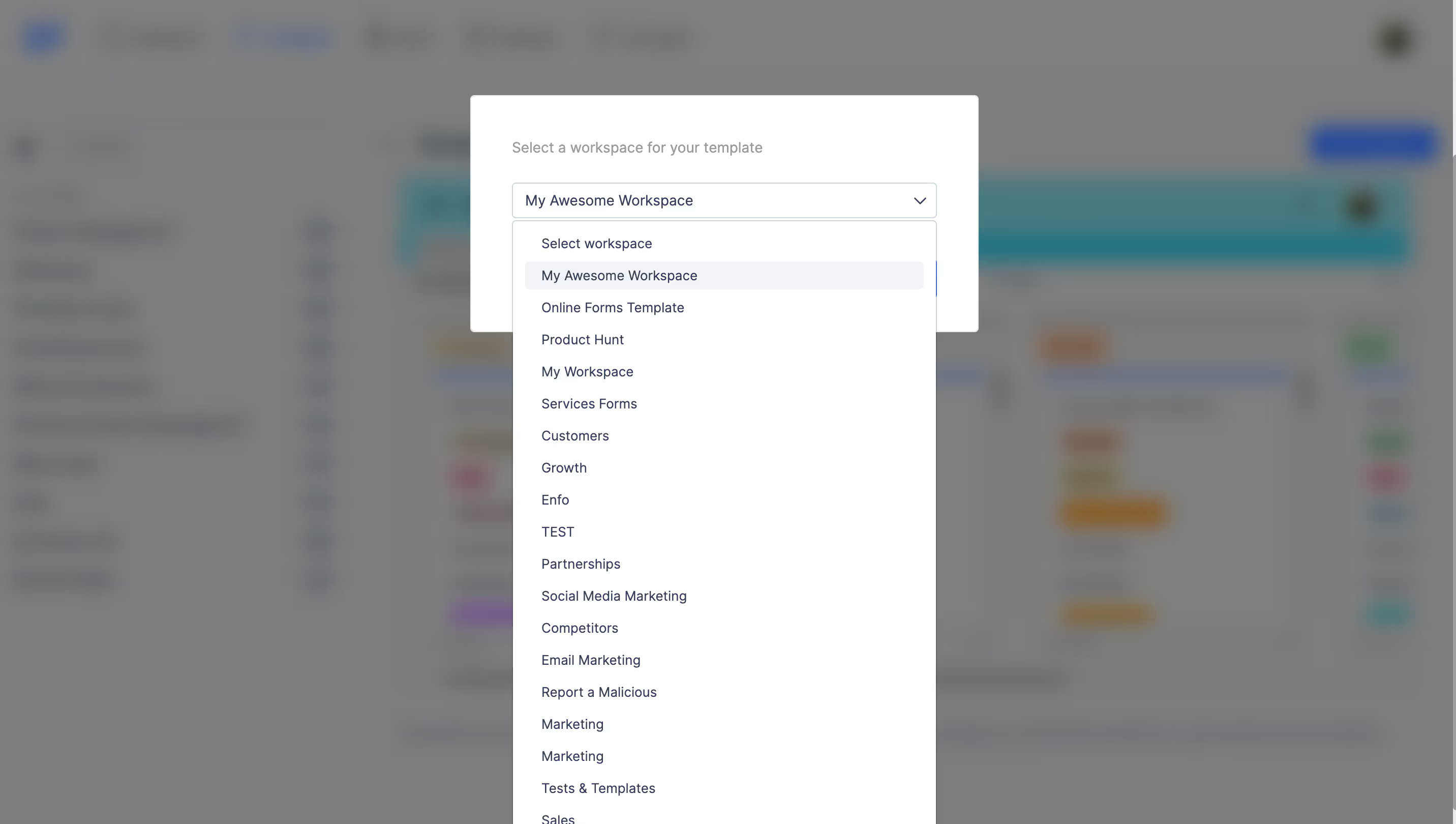
- If the template meets your requirements, click the "Use template" button.
- Select the workspace where you want to add this new template from the dropdown menu.
- Then, you will be directed to your spreadsheet with the chosen template.
- Customize the template further to fit your specific needs by adding or modifying fields, views, and records as necessary.
Conclusion
By mastering these import features, you can efficiently migrate all your essential data into Retable, making it your centralized platform for data management and collaboration. And with the help of Retable’s templates, you’re well-equipped to jumpstart your projects with ease. Explore these features to make the most of your Retable experience and elevate your data organization to the next level. 🌟
Elevate your Retable experience by getting started for free today! Dive into the Retable Academy to discover a treasure trove of resources that will enrich and support your journey.
more
Related Resources
Create your smart data management solution
Plan, track, and analyse with your ease. Transform your data with an all-in-one platform, collaborate with your teammates.
Try for free!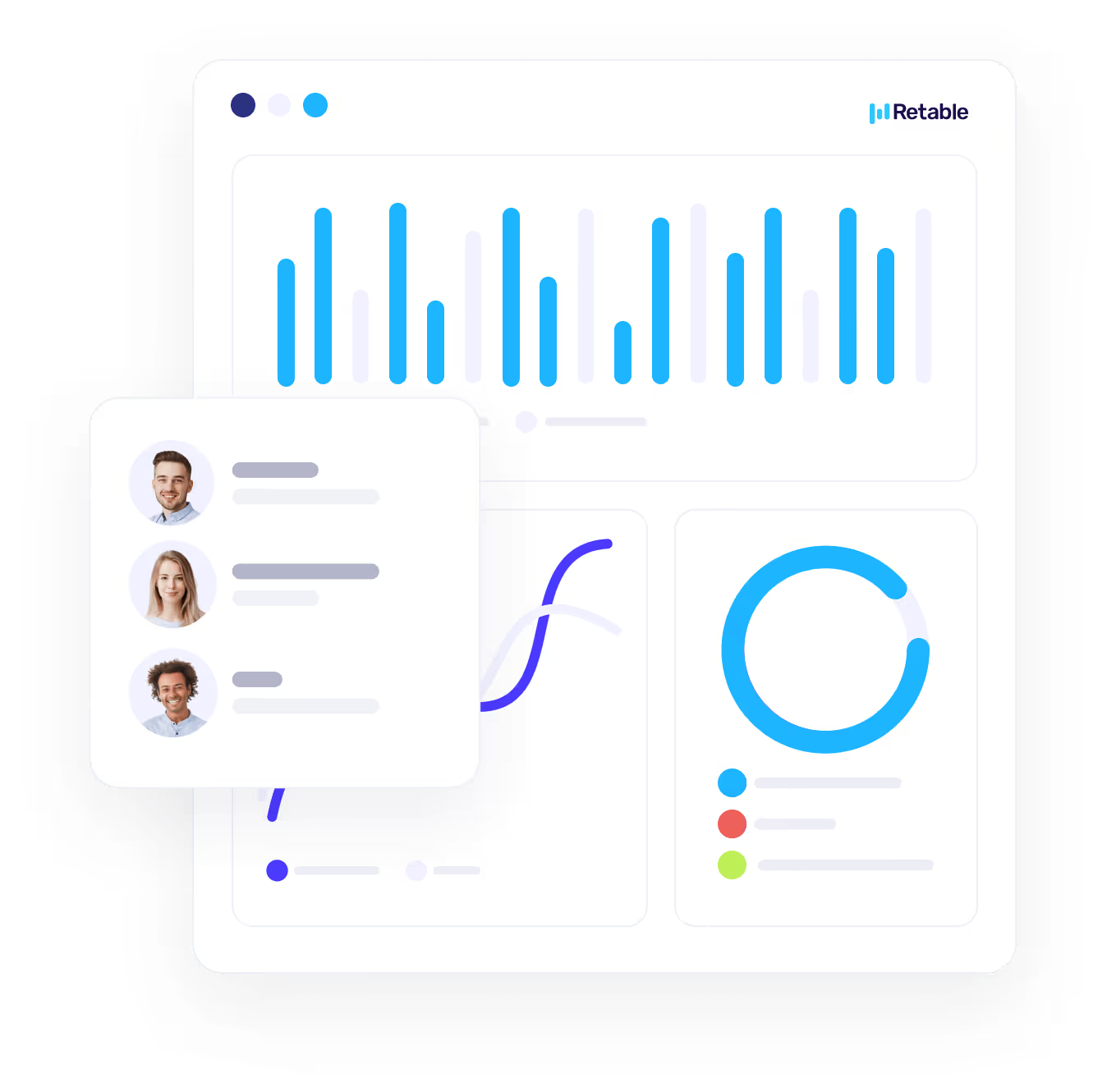
.avif)

.avif)
.avif)
.avif)